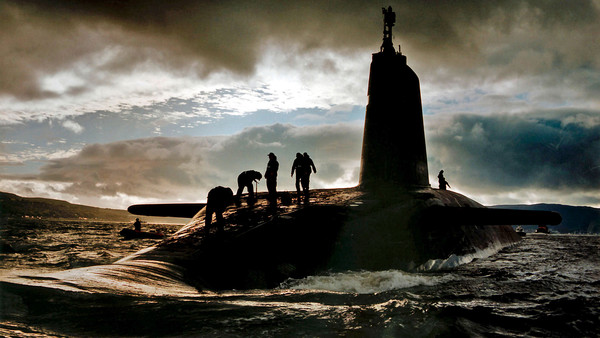
From James Blitz, Financial Times: [A]s London struggles to regain control of its finances, debate is stirring about the affordability of the independent nuclear deterrent.
Between now and 2016, Britain must decide whether to replace the four submarines which carry nuclear-tipped Trident II missiles with a like-for-like replacement. The capital cost of replacing the four existing boats, which are ending their service lives, will be £25bn. The construction programme will consume at least one-third of the Ministry of Defence’s equipment budget after 2020.
Given such costs, Britain’s nuclear deterrent will be the subject of heated arguments this year. While the government is ultimately likely to approve the full project, it must make its case in the face of a growing chorus of politicians and analysts who are considering whether the country should go for cheaper alternatives, such as submarines armed with nuclear-tipped cruise missiles. Some are asking whether Britain and France should work jointly on a nuclear deterrent rather than pour money into separate, parallel programmes. A few well-known public figures question the sense of the UK having nuclear weapons at all. “I think [the UK nuclear arsenal] is completely past its sell-by date,” says Michael Portillo, defence secretary in a previous Conservative government. “It is neither independent, nor is it any kind of deterrent because we face enemies like the Taliban and al-Qaeda, who cannot be deterred by nuclear weapons. It is a tremendous waste of money and is done entirely for reasons of national prestige. . . .”
The Conservative party, along with much of the British defence establishment, believes that the Trident system provides a cast iron guarantee that the UK can deter aggression from anywhere in the world between now and the 2060s. It is the ultimate insurance that Britain cannot be overrun or blackmailed by a foreign power because it could inflict immense destruction on any foe. . . .
But the Liberal Democrats, the junior partner in the governing coalition, are raising doubts. They want a cheaper system, arguing that the UK could launch cruise missiles from a new fleet of multipurpose submarines. To resolve this difference, the government has just completed an internal report on alternatives to Trident that will be published this year. . . .
The only realistic alternative is a cheaper, submarine-launched system. The Lib Dem suggestion is that some of Britain’s new Astute submarines carry the deterrent, using nuclear-tipped cruise missiles. However, Philip Hammond, the defence secretary and a supporter of a full Trident replacement, says this is unlikely to be cheaper because it would mean designing new missiles and warheads for the Astutes.
“Given that we have the warheads, we have the missiles, and we are only talking about replacing the submarine,” he argues, “it is difficult to envisage how a new complete system in which you have to design everything from scratch could ever be a more economic proposition. . . .”
Even so, this has not stopped some critics wanting to take the debate on Trident further and ask more fundamental questions about whether the UK needs its own nuclear weapons.
One argument is that in an age of increasingly covert warfare, one in which cyberattacks and killer drone operations are set to be the norm, nuclear weapons will be redundant. Nuclear powers will not necessarily know who has attacked them. If they do not know the enemy to target with nuclear weapons, it is not clear what value a deterrent has.
A second argument is that the UK should, along with nearly all European members of Nato, rely on the US strategic nuclear umbrella. It would then be able to spend precious funds on the kind of conventional military hardware that Britain – and European members of Nato – really need. “Much of the rest of Nato believes that sheltering under the US or Nato umbrella gives sufficient security,” says Sir Nick Harvey, a former Lib Dem defence minister who has led the debate on Trident’s future in parliament. “You have to ask whether the British, French and Americans all doing their own thing in the nuclear weapons field is the best way to operate.”
Mr Portillo is of a similar view. He believes the notion that the UK’s deterrent is independent is a myth. “We couldn’t conceivably use our nuclear weapons without US permission. Can anyone imagine us nuking North Korea, Iran, Afghanistan or Pakistan without US agreement? Of course, if there were any firing to do the USA would do it. . . .”
All three main political parties are committed to nuclear disarmament solely through a process of multilateral negotiation. If the US and Russia – which have 95 per cent of the world’s nuclear weapons – make further deep cuts in their arsenals, then Britain, along with other states, will continue to follow suit. Otherwise, any adjustment to Britain’s nuclear posture is likely to be limited. (photo: Crown)
Image: crown%201%2010%2013%20UK%20sub.jpg
